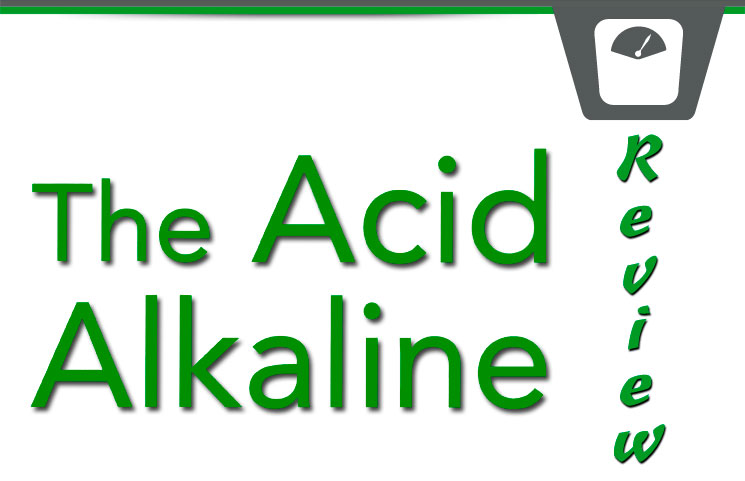Acid Alkaline Diet Review
Becoming popular in 2013, the Acid Alkaline Diet focuses on the high consumption of fruits, vegetables, and unprocessed whole foods to reach a state of optimal health.
The theory behind this diet is that eating more foods with pH on the alkaline side of the scale can help keep our pH balance in a desirable, alkaline range. Those who believe in this diet say it can help dieters drop extra pounds and protect against many diseases.
Other reported benefits include lower cholesterol, blood pressure, and triglycerides.
Those who believe in this diet claim that acidic foods compromise the body’s ability to retain essential minerals like magnesium, potassium, and calcium. This is why the diet is promoted as a balancing tool for the average modern diet, which has become geared towards foods that are acidic in nature, like grains, animal protein, and refined sugar.
Understanding the Acid Alkaline Diet
Understanding basic chemistry will help you figure out how exactly this Acid Alkaline Diet works. When the body metabolizes food, it is actually extracting energy, and just like a fire, there is residue left behind. This residue can be alkaline, acid, or neutral on the pH scale, depending on the source of food.
On the pH scale, there are 14 points, with 0 representing a fully acidic value, 7 in a neutral position, and 14 representing an alkaline value. Our blood typically runs slightly alkaline, usually between 7.35 and 7.45. However, when highly acidic foods are introduced, this number can switch, causing the blood’s pH to become out of balance.
Typically, our bodies are able to correct and balance pH levels. When we eat something acidic, acid is expelled through urine or released in the form of carbon dioxide.
What Science Says About The Acid Alkaline Diet
Despite a loyal following of users who swear by the acid alkaline diet, there is actually no scientific evidence that shows that choosing alkaline foods alters the body’s pH balance.
Data gathered by the NIH clearly shows that acidic foods in general, specifically dairy products like milk, cheese, or butter, do not make the body acidic whatsoever.
A large amount of the research on the effect of acid and alkaline levels focuses on bone health. The body’s ability to maintain bone density and provide optimal structural support is determined by a number of factors though, not just the body’s pH levels.
Participants in a study, known as the Framingham Osteoporosis Study, who are more fruits and vegetables, along with higher levels of potassium and magnesium, had better bone density readings over a four year time period. Eating more protein also resulted in favorable levels of bone density.
A second study examined the relationship between dietary acid and bone mineral density and found there was absolutely no connection between the two. A later Canadian trial found no associated between the excretion of acid or the urine pH levels, and the development of osteoporosis.
An analysis from data gathered from numerous studies was compiled in a report published in The Journal of Nutrition. In the analysis, researchers clearly found that an acidic diet does not have an effect on bone mineral density, except in older men. However, adequate calcium intake could likely neutralize this effect.
The Diet Itself
Despite the lack of scientific proof, the acid alkaline diet is still growing in popularity. Choosing alkaline foods is actually not as difficult as you might expect, since the range of both alkaline and acidic foods ranges greatly. Beef for example is highly acidic whereas fish is very alkaline.
Leafy greens are typically considered alkaline as well as many beans and nuts. It’s actually easier to identify the foods that are acidic in nature, which include:
— Alcoholic Drinks
— Anything Sweetened With Sugar
— Wheat, Barley, And Rice
— Beans And Legumes
— Cheese, Butter, Ice Cream
— Cashews, Peanuts, Walnuts
— Corns, Olives, And Winter Squash
In reality, most fruits and vegetables are alkaline, which is why the acid alkaline diet focuses primarily on these foods. Stevia is the only sweetener with an alkaline value, and certain dairy products like yogurt and kefir are allowed too.
The list of alkaline and acidic foods is very long and difficult to navigate, which is one of the biggest issues with the diet.
Acid Alkaline Diet Health Benefits
Despite the lack of scientific evidence, it is still feasible to suggest the acid alkaline diet could have a positive impact on one’s health. This is primarily because the diet focuses on fresh fruits and vegetables, which have a positive impact on weight and overall health.
Supporters of the acid alkaline diet claim it can extent your lifespan and prevent disease, perhaps even cancer. Further studies may expose the truth about the acid alkaline diet, but until then, we’re not quite sold on whether this diet has any merit.









